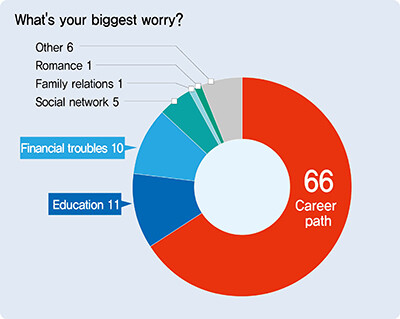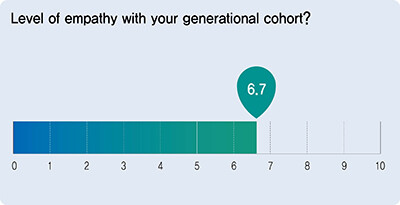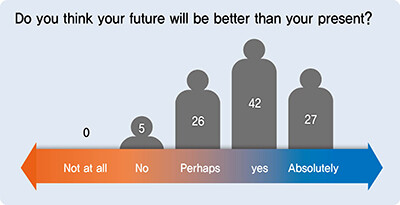hankyoreh
Links to other country sites 다른 나라 사이트 링크
[Special report] S. Korean youth values health and financial stability the most
The narrative about the grim reality facing South Korean young people was launched by “The 880,000 Won Generation,” a book authored by Woo Seok-hun and Park Gwon-il in 2007. Then in 2011, the Kyunghyang Shinmun coined the term “sampo generation,” meaning that youth today have to give up three things — namely, romance, marriage, and children. Later on, that list grew from three to 10 values abandoned (“shippo generation”), including employment, home ownership, human relationships, hope, health, personal appearance, and even life itself. The concept was eventually expanded to the nth degree, expressed by the term “n-po generation.” Paradoxically, the ever-expanding list of things that young people are forced to give up can be understood as their desperate cry to be allowed to keep them.

As part of the “100 Korean youth” series, we carried out in-depth interviews and questionnaires in order to determine how 100 young people between the ages of 19 and 23, selected proportionally according to region, gender, educational background, and alma mater, actually think about such narratives. The results were initially surprising, though the more we thought about them, the more sense they made. When the 100 interviewees were asked about the most important things in life (allowing multiple responses), the most popular of the 127 answers provided were overwhelmingly “health” (35) and “financial stability” (34). Trailing behind was “family,” chosen by 15 of the interviewees. “Self-actualization,” “success,” and “growth” were each chosen by only one person, while “achievement” was more common, at 10.

Regarding health and financial stability as the most important things in life would seem to indicate that the interviewees’ hope of success is outweighed by their fear of failure. This also applies to family, the third most popular response. By choosing health, financial stability, and family, the interviewees are effectively saying that the pillars holding up their lives are not national health care or other welfare programs but are their own personal efforts to stay healthy, a minimum of financial resources, and their families. That shows the influence of the “every man for himself” mentality in Korean society, as well as the credo that you have to “pick yourself up by your bootstraps.”

That doesn’t mean that young people are down for the count, however. When asked whether there’s a possibility of their lives improving in the future, 69 of the youth said there is, while 26 said they weren’t sure. Only five people said that such improvement was impossible. For the most part, even youth who go unnoticed by society are still diligently striving to create their desired lifestyle. One such person is Song Su-gyeong (pseudonym), who has a part-time job at a beauty shop. She told the Hankyoreh that she was sure her life would improve over time. Her dream is to open a makeup shop in Seoul’s fashionable Cheongdam neighborhood in the Gangnam District. In pursuit of that dream, Song opted to start her career in lieu of going to university. “In the makeup industry, work experience is more important than educational background. More people do a two-year program than a four-year one, and hair dressers I’m acquainted with have said I’d be better served by getting two years of work experience. I decided to get started early.”
Song takes classes at a makeup academy from 6:30 to 10 pm, three days a week. She also has a chance to put what she’s learning into practice, on the job. On the weekends, she does part-time work at a beauty shop. She’s already earned a government license for makeup and level-two certification for eyelash extensions from a private organization, and she’s gearing up to apply for jobs. Song believes that, if she learns a little more at the academy and gets recognition for her talent, it won’t take long to find a job. Granted, she’s not sure if Korean society will ever become fair. It’s always been unfair, and she doesn’t think that earnest efforts are capable of changing that. But she believes that her future, at least, can be changed. “I think that someday I’m going to be rewarded for all my efforts now. I’m sure of it.”
“I just want to be able to take care of myself”
Yu Su-min, 22, who is majoring in photography at Sangmyung University, in Cheonan, South Chungcheong Province, dreams of being a freelance photographer. Yu took a shine to the subject while taking photographs with her father’s DSLR camera as a child. “I want to be successful,” she said. But Su-min’s idea of success isn’t some grandiose vision of dominating other people, as success is typically understood in Korean society. “There are tons of things that are important in life. Money’s important, of course, but I think that honor is the most important of all. All this talk about money and honor sounds a little pretentious, but I’m not talking about anything big. I don’t need to make a fortune; I just want to be able to take care of myself. I’d just like to be prosperous enough to eat as I please and buy the things I want. The same goes for honor — I think I’d be happy with getting established in my field,” he said.
An Do-yeon, 21, a student at Hanshin University, talked about having enough money to keep pursuing her interests. After dropping her original plan of applying to art school, she was preparing for another round of the Suneung (Korea’s hugely important university entrance exam) when she finally started to realize what she actually wants to do — rather than getting admitted to a prestigious university and landing a job. “What I wanted to study was philosophy. So I sent applications to universities with philosophy departments and was accepted at my current place. I’ve been satisfied since coming here; I really like my friends and professors.”
When asked to rate her satisfaction with college life, Do-yeon gave it a nine out of 10. She wants to be a writer and said she’ll soon start preparing to apply for jobs in the news media. Despite being in the philosophy department — a notorious dead end, career-wise, even compared to other humanities majors — she doesn’t seem too worried. “The joy in life comes from doing what you’re interested in, but [arranging that kind of life] seems pretty tough. I don’t want to do something I don’t find interesting just to make a living. I think what’s most important is working in my area of interest, or if that’s not feasible, to make enough money to maintain my interests.”
One of the impressions we got from meeting the 100 young people in this series is that most of them don’t long for the glitzy lifestyle of the main character in a cinematic blockbuster. In their eyes, success and accomplishment mean being passionate about something and having the financial stability to keep that passion alive. While we were on the train, covering some of the 10,000km we traveled to interview these 100 young people, we found ourselves asking the following questions. If Korean society doesn’t make it possible for young people to indulge in such a modest dream, does it even deserve to be called a society? And isn’t it time we started pulling these young people out of the pit of “every man for himself” and “pick yourself up by your bootstraps”?
By Kim Hye-yun, Kim Yoon-ju, Seo Hye-mi, and Kang Jae-gu, staff reporters
Please direct comments or questions to [english@hani.co.kr]

Editorial・opinion
![[Column] Has Korea, too, crossed the Rubicon on China? [Column] Has Korea, too, crossed the Rubicon on China?](https://flexible.img.hani.co.kr/flexible/normal/500/300/imgdb/original/2024/0419/9317135153409185.jpg) [Column] Has Korea, too, crossed the Rubicon on China?
[Column] Has Korea, too, crossed the Rubicon on China?![[Correspondent’s column] In Japan’s alliance with US, echoes of its past alliances with UK [Correspondent’s column] In Japan’s alliance with US, echoes of its past alliances with UK](https://flexible.img.hani.co.kr/flexible/normal/500/300/imgdb/original/2024/0419/2317135166563519.jpg) [Correspondent’s column] In Japan’s alliance with US, echoes of its past alliances with UK
[Correspondent’s column] In Japan’s alliance with US, echoes of its past alliances with UK- [Editorial] Does Yoon think the Korean public is wrong?
- [Editorial] As it bolsters its alliance with US, Japan must be accountable for past
- [Guest essay] Amending the Constitution is Yoon’s key to leaving office in public’s good graces
- [Editorial] 10 years on, lessons of Sewol tragedy must never be forgotten
- [Column] A death blow to Korea’s prosecutor politics
- [Correspondent’s column] The US and the end of Japanese pacifism
- [Guest essay] How Korea turned its trainee doctors into monsters
- [Guest essay] As someone who helped forge Seoul-Moscow ties, their status today troubles me
Most viewed articles
- 1[Column] The clock is ticking for Korea’s first lady
- 2After 2 months of delayed, denied medical care, Koreans worry worst may be yet to come
- 3Hong Se-hwa, voice for tolerance whose memoir of exile touched a chord, dies at 76
- 4[Column] Has Korea, too, crossed the Rubicon on China?
- 5[Correspondent’s column] In Japan’s alliance with US, echoes of its past alliances with UK
- 6Samsung barricades office as unionized workers strike for better conditions
- 7All eyes on Xiaomi after it pulls off EV that Apple couldn’t
- 8[Editorial] As it bolsters its alliance with US, Japan must be accountable for past
- 9[News analysis] After elections, prosecutorial reform will likely make legislative agenda
- 10US overtakes China as Korea’s top export market, prompting trade sanction jitters